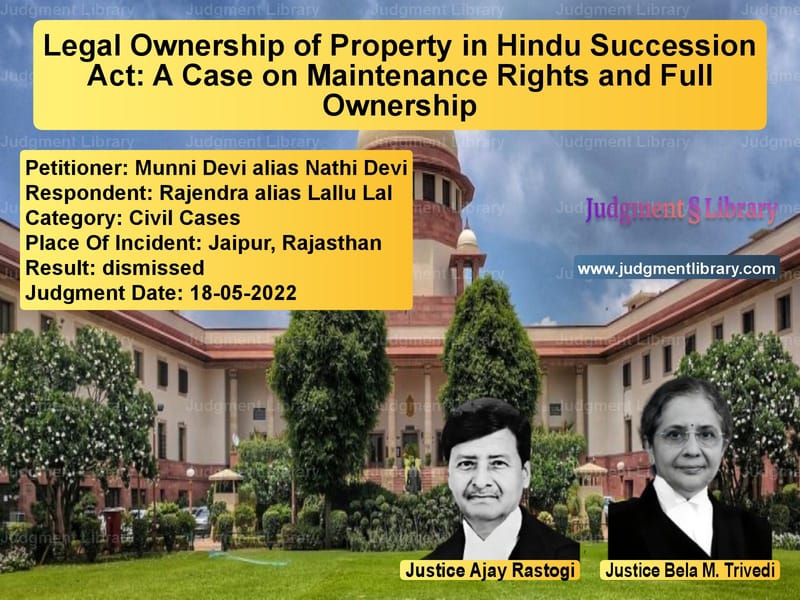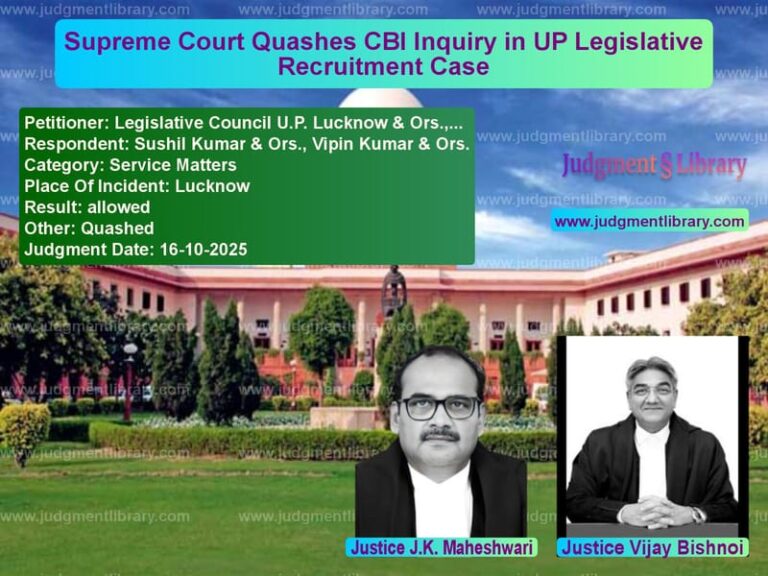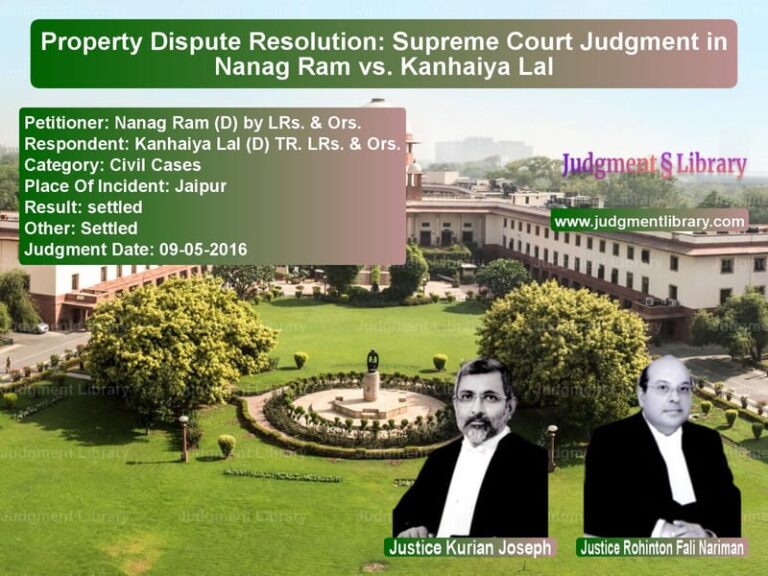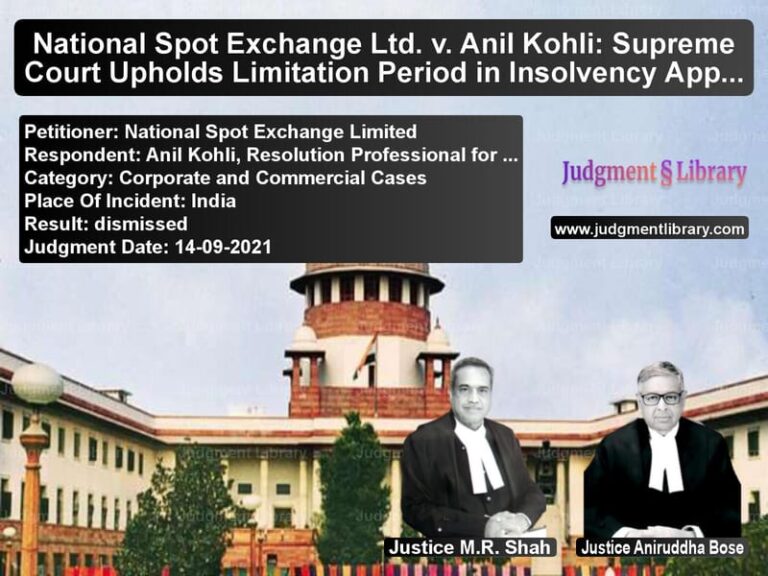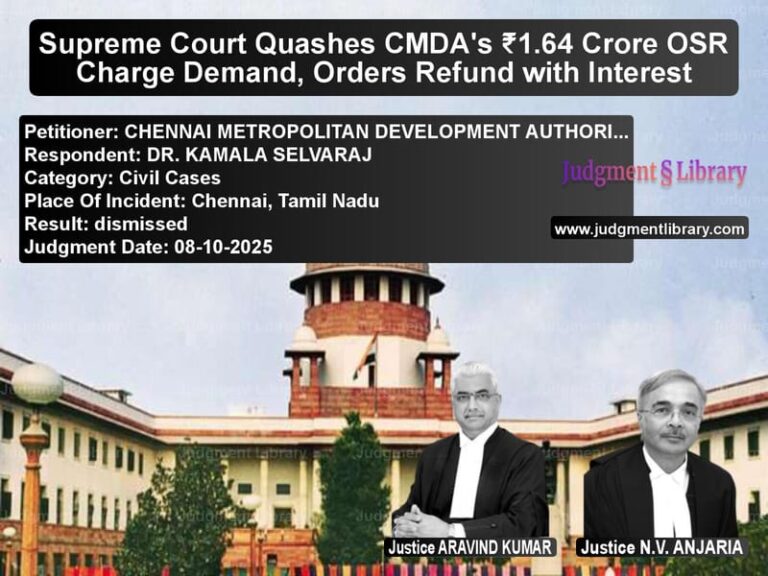Legal Ownership of Property in Hindu Succession Act: A Case on Maintenance Rights and Full Ownership
This case involves a legal dispute concerning the ownership of an ancestral property under the Hindu Succession Act, 1956. The appellants, heirs of the deceased Munni Devi, challenged the findings of the Rajasthan High Court, which had dismissed their suit for possession of the property that was originally held by their ancestor, Harinarayanji. The crux of the case was the interpretation of Section 14(1) of the Hindu Succession Act, which governs the rights of Hindu women to property, particularly regarding their rights to property that they occupy in lieu of maintenance.
The case centers on the right of Bhonri Devi, the widow of Dhannalalji, to claim full ownership of the suit property that she had been residing in. Bhonri Devi, after the death of her husband and father-in-law, was in possession of the property, collecting rent from tenants. The appellants argued that Bhonri Devi’s right to the property was limited and could not extend to full ownership under the provisions of Section 14(1) of the Hindu Succession Act.
Petitioner’s Arguments
The appellants’ lawyer, Mr. Puneet Jain, raised several arguments against the High Court’s decision. He argued that Bhonri Devi’s possession of the property was merely due to her right to maintenance under Shastric law, not due to ownership of the property. The appellants further argued that the Hindu Women’s Rights to Property Act, 1937, and its successor, the Hindu Succession Act of 1956, did not provide for Bhonri Devi to claim ownership of the property, especially considering that the suit property was part of an HUF (Hindu Undivided Family) estate and that no formal document recognized her ownership.
Read also: https://judgmentlibrary.com/supreme-court-restores-lok-adalat-compromise-in-family-property-dispute/
Additionally, the appellants contended that Bhonri Devi’s possession could not automatically convert into full ownership without a clear transfer of rights or a documented charge. They cited previous rulings to argue that mere possession or right to maintenance does not give rise to full ownership under Section 14 of the Hindu Succession Act unless there is a specific vestige of limited ownership to begin with.
Respondent’s Arguments
The respondents, represented by Mr. Pallav Shishodia, countered the appellants’ arguments by asserting that Bhonri Devi’s possession of the property was in fulfillment of her pre-existing right to maintenance. They argued that under Section 14(1) of the Hindu Succession Act, any property that a Hindu widow occupies in lieu of maintenance becomes her absolute property. The respondents further argued that Bhonri Devi had been in possession of the property for several decades, managing it by collecting rent from the tenants, which amounted to acquiring full ownership by operation of law.
The respondents pointed out that the property was part of the HUF of her late husband, and after the death of her father-in-law, Bhonri Devi was the rightful person maintaining the property. They cited the case of V.Tulasamma v. Sesha Reddy, where it was held that a widow’s pre-existing right to maintenance can lead to full ownership under Section 14(1) of the Hindu Succession Act.
Court’s Analysis and Conclusion
The Supreme Court analyzed the case in light of Section 14(1) of the Hindu Succession Act, 1956, which states that property possessed by a Hindu female, whether acquired before or after the commencement of the Act, shall be held by her as full owner thereof and not as a limited owner. The Court discussed the pre-existing right to maintenance and its role in determining the ownership status of a Hindu widow who has been in possession of property.
The Court found that Bhonri Devi had been in settled possession of the suit property, which she had acquired in lieu of her maintenance right. Her possession was not questioned by the appellants, and it was clear that she had been maintaining the property by collecting rent from tenants. The Court emphasized that under Section 14(1), possession of the property by a Hindu widow in lieu of maintenance automatically confers full ownership, thus overriding any limited rights she may have had earlier.
The Court further noted that while the appellant raised several objections about Bhonri Devi’s right to claim full ownership, particularly in relation to the application of Section 14(1), the law provides that when a Hindu widow is in possession of property, her right to maintenance allows her to acquire full ownership. The Court concluded that the High Court was correct in holding that Bhonri Devi had become the full owner of the property under the provisions of the Hindu Succession Act, 1956.
Final Decision
The appeal was dismissed, and the decision of the Rajasthan High Court was upheld. The Court ruled that Bhonri Devi had acquired full ownership of the suit property by virtue of Section 14(1) of the Hindu Succession Act. The appeal was found to be devoid of merit, and the suit filed by the appellants was dismissed.
Petitioner Name: Munni Devi alias Nathi Devi.Respondent Name: Rajendra alias Lallu Lal.Judgment By: Justice Ajay Rastogi, Justice Bela M. Trivedi.Place Of Incident: Jaipur, Rajasthan.Judgment Date: 18-05-2022.
Don’t miss out on the full details! Download the complete judgment in PDF format below and gain valuable insights instantly!
Download Judgment: munni-devi-alias-nat-vs-rajendra-alias-lallu-supreme-court-of-india-judgment-dated-18-05-2022.pdf
Directly Download Judgment: Directly download this Judgment
See all petitions in Property Disputes
See all petitions in Succession and Wills
See all petitions in Damages and Compensation
See all petitions in Judgment by Ajay Rastogi
See all petitions in Judgment by Bela M. Trivedi
See all petitions in dismissed
See all petitions in supreme court of India judgments May 2022
See all petitions in 2022 judgments
See all posts in Civil Cases Category
See all allowed petitions in Civil Cases Category
See all Dismissed petitions in Civil Cases Category
See all partially allowed petitions in Civil Cases Category

